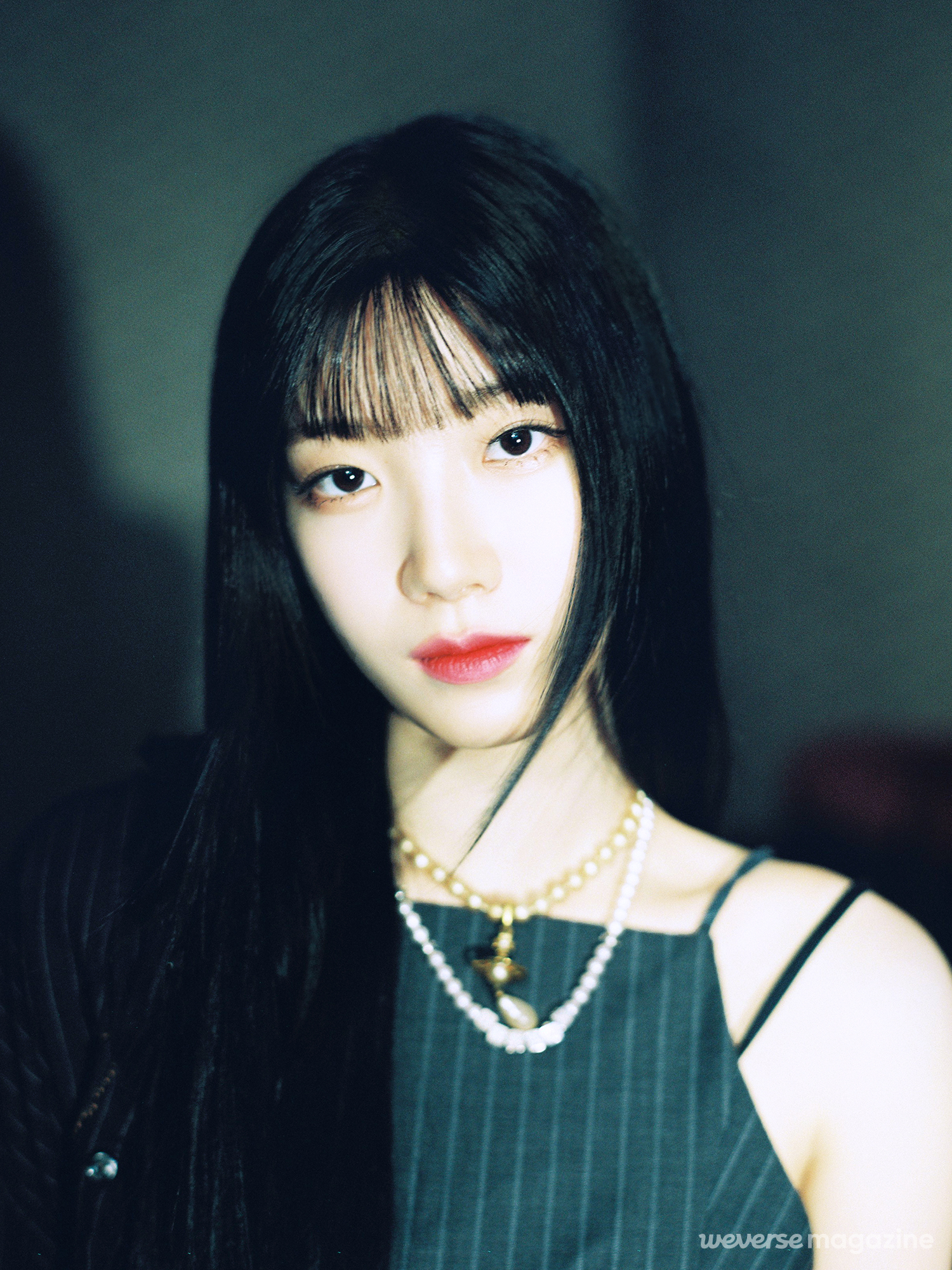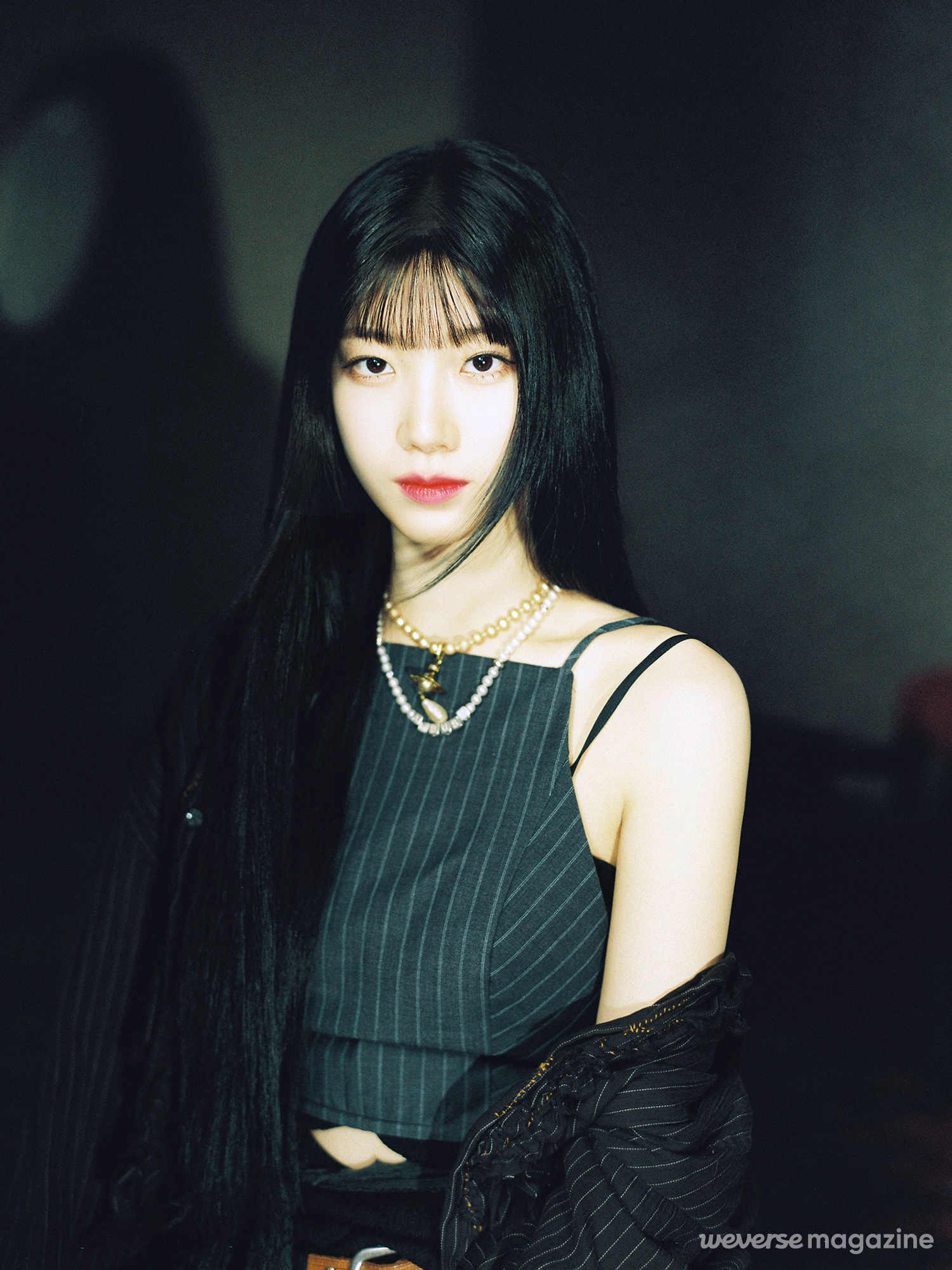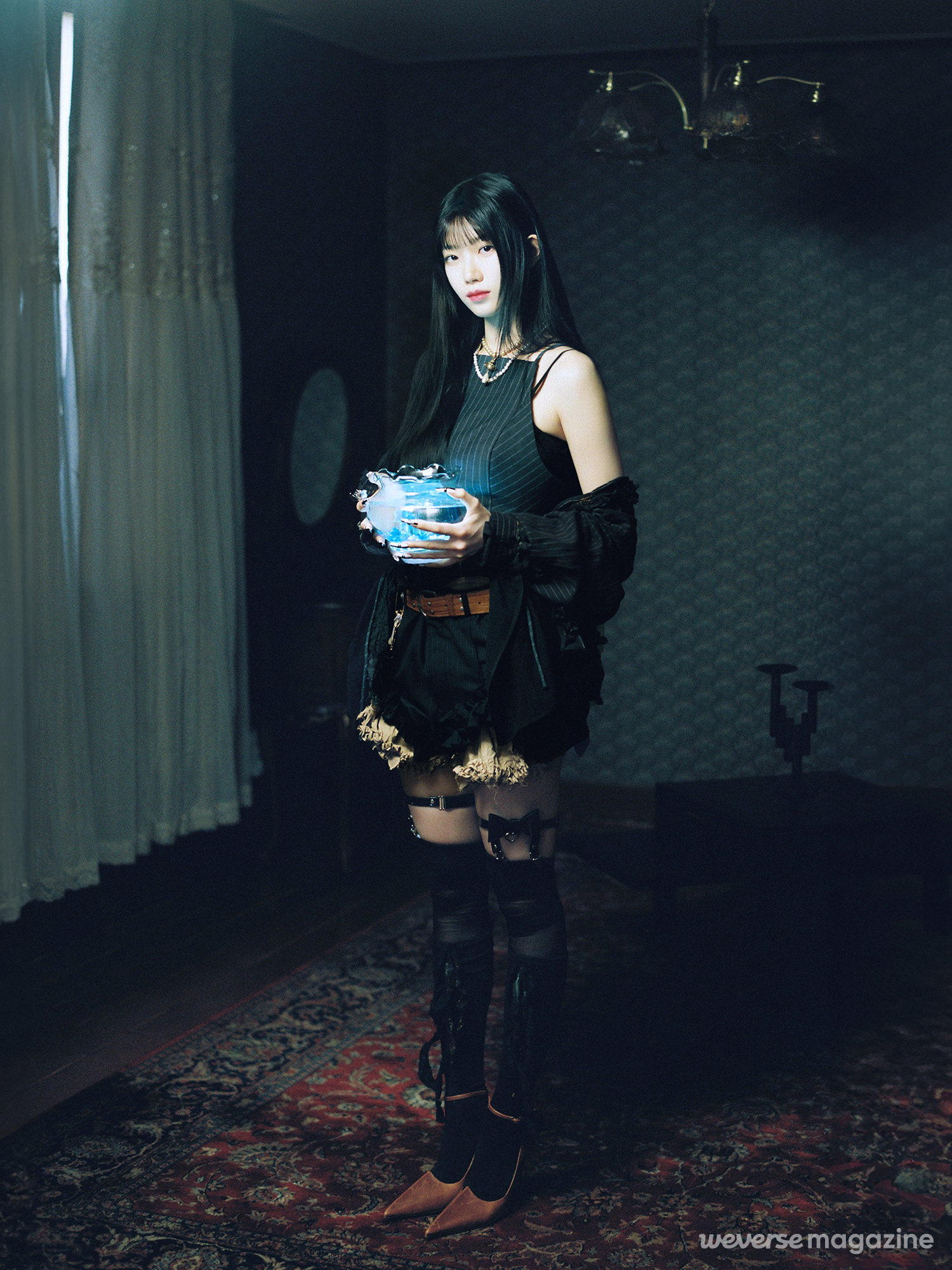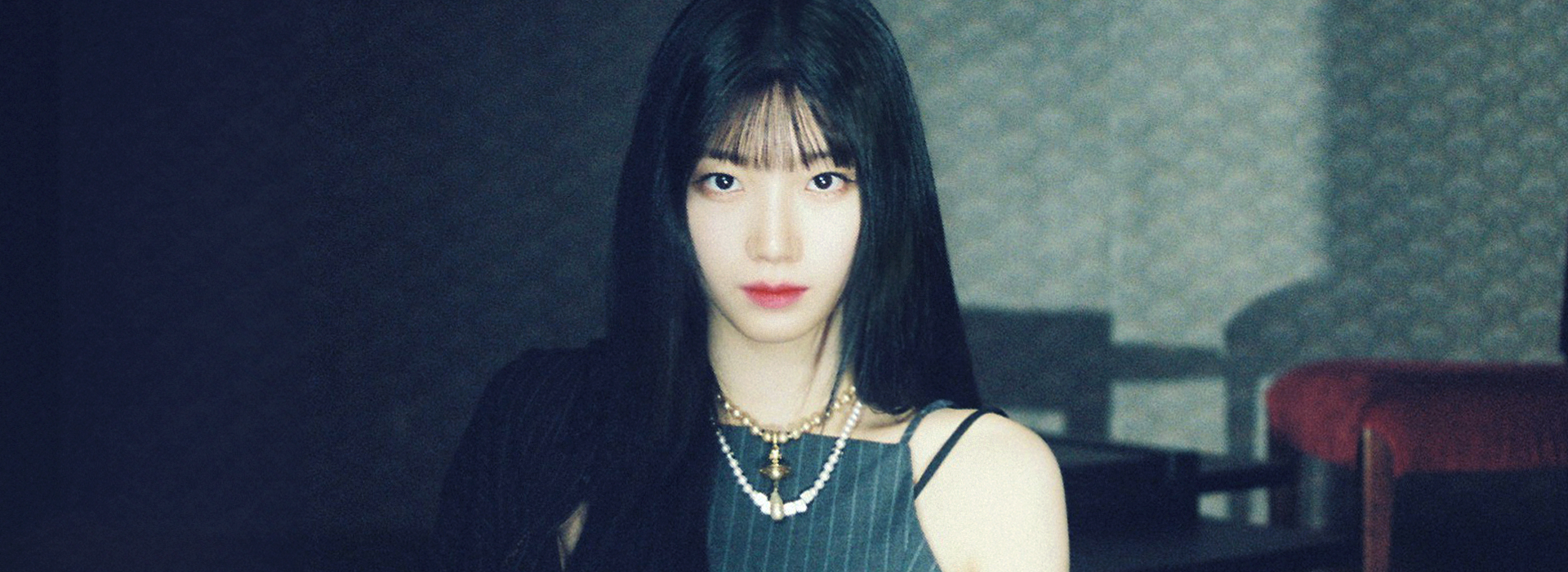
KAZUHA’s upright silhouette is a testament to the countless hours of practice she’s put in throughout her life. And the power of that deep-seated dedication can transform her upright posture into “EASY,” effortless swag at a moment’s notice. And still, KAZUHA’s desires lie in pressing forward—as an idol.
-
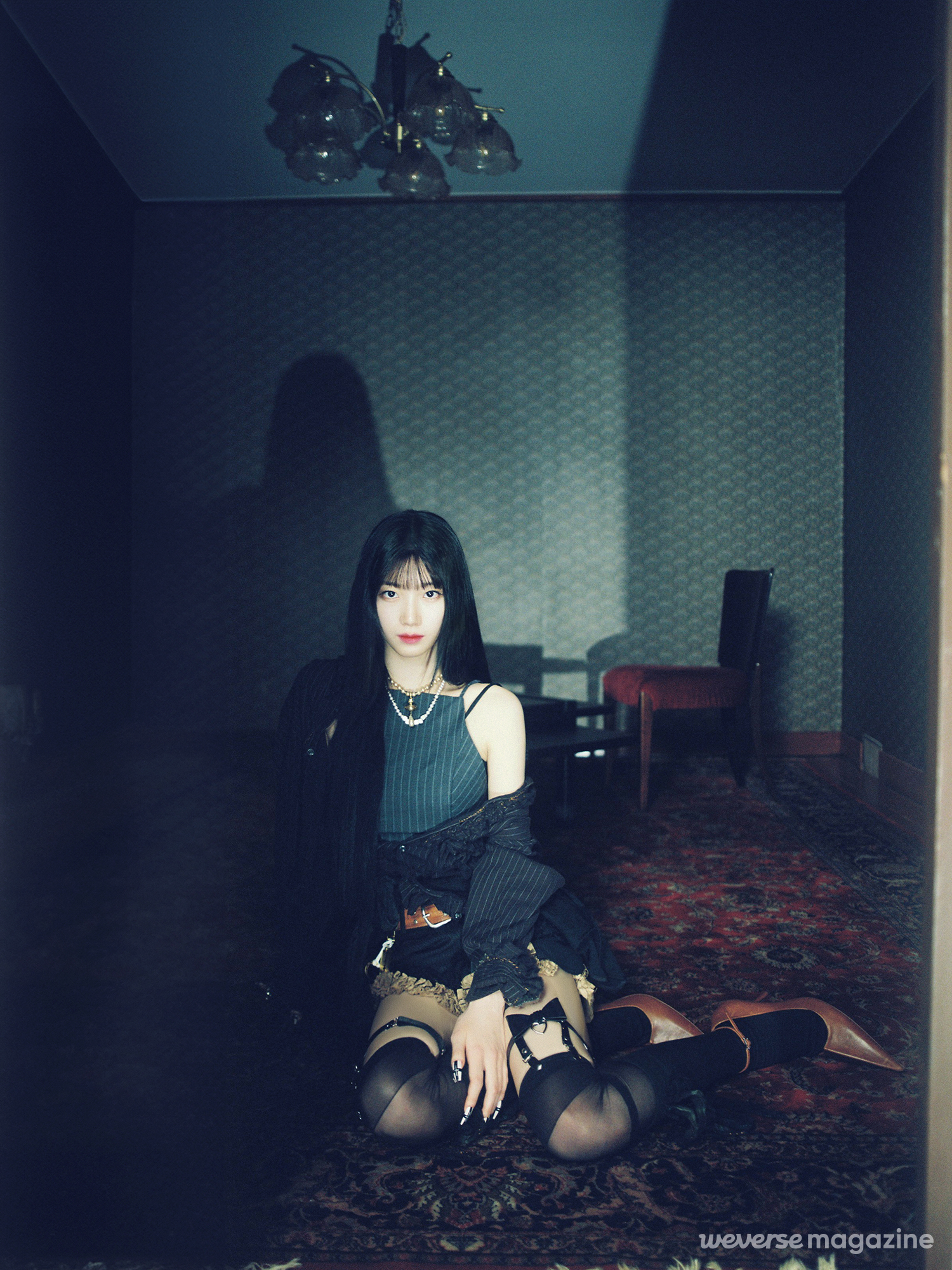 Newsian upcycled pinstripe shirt, upcycled pinstripe short trousers, and upcycled lace belt; GANNI pinstripe top; UNDERCOVER key ring; Acne Studios leather heels; stylist-owned vintage necklace, belt, and socks.
Newsian upcycled pinstripe shirt, upcycled pinstripe short trousers, and upcycled lace belt; GANNI pinstripe top; UNDERCOVER key ring; Acne Studios leather heels; stylist-owned vintage necklace, belt, and socks.
“Transit Friendship” of LENIVERSE has been released, and you guys are serious about “getting in character.” (laughs)
KAZUHA: We decided on our characters’ ages, names, and personalities in advance, just roughly. I thought about going by Kang Juha, but then I found this online Japanese-to-Korean name converter, and it came out as Park Yeonjoo. I told the other members and they said it sounded alright so I went with that. There was no script, and no plan at all, so I just went with the flow. It’s always fun no matter what I’m doing with them because anything goes.
You always keep things light-hearted and make people laugh.
KAZUHA: I love it when I can make everybody laugh. Even though it’s a bit tiring shooting everything these days, a little laughter goes a long way and makes things fun. It helps us feel closer and that makes everything more comfortable.
Is that a trait you were born with?
KAZUHA: Maybe? I guess so. I wasn’t really the type to goof around, but I learned a lot after coming to Korea. (laughs) I’m the type of person who likes to hang out with the same close friends for a long time, so I always joke around with them. Seeing as I only ever had friends the same age as me before, having older and younger friends was a change for me.
Did you get to catch up with some old friends when you performed in Osaka during the tour last year?
KAZUHA: It was the first time seeing them in three to four years, and while everyone’s matured and looks really grown-up (laughs) it felt like we just saw each other yesterday. A friend from my old school even updated me on how our classmates were doing. It was nice to hear everyone’s having a good life.
How did it feel seeing people close to you during the tour as a member of LE SSERAFIM now? I saw you shed some tears in Osaka despite not usually being one to cry.
KAZUHA: Returning to the place I grew up in under new circumstances was very emotional. My family, my grandparents, and my friends all came out to see us on tour. It felt like an opportunity to show everyone how much I’ve grown as a part of this new group. They all cheered me on and supported me. I felt so proud. I always prepare some closing remarks for each concert, and I went on stage there with what I wanted to say like always. But then, I spotted my parents in the crowd. I wanted to tell them how thankful I was, and when I did, and I saw their faces, I completely swelled up with emotion.
You had already lived abroad before joining the group, too. Do you find there’s something uniquely comforting about being home?
KAZUHA: Knowing I have a safe place to return to is a big source of inner strength for me. I spent time going to and from overseas, so I don’t usually feel like, I really miss home! (laughs) But being home means I don’t have to think about anything and can just be myself. I guess that’s why I feel happy whenever I go back.
Though I imagine there’s not much time for it, what do you enjoy about “being yourself”?
KAZUHA: It’s mostly the same, but … how should I put it? It allows me to keep my thoughts simple. Being an idol’s always been and still is really fun, but when you only live inside that world, you might start to take everything for granted and think it’s what real, everyday life looks like. But the truth is, we shouldn’t take any of this for granted. So from that perspective, I think I can have simpler thoughts and enjoy the work even more.
You’ve said that you tend to overthink small decisions like your nail color or what to eat, so how do you handle that?
KAZUHA: I guess my overthinking stems from not wanting to have any regrets, but I’m working on breaking the habit. This is a small step, but when I go shopping with our manager, I get their opinion and just go with it. When I used to ask for advice, I’d make things complicated by following something closer to what I already had in mind. That’s the kind of person I was. (laughs) That’s exhausting, as you can imagine. So I try not to do that anymore and just go with whatever I’m recommended. It’s been working out better than I would’ve expected.
What about when you have bigger decisions to make, like when you chose to pursue K-pop?
KAZUHA: When making big decisions, I try to listen to my inner voice. Even though it’s there inside me, it’s hard to know what it’s telling me. But I was really certain about that one. At the time, I would analyze myself and make a life plan and write it up on my laptop—what I would do if I debuted, and what I wanted to accomplish on that road. Seeing those visions of mine become reality felt absolutely surreal. Not that those things just happened magically because I wrote them down, of course—they’re the result of a consistent effort, and that’s a reminder for me never to forget that motivation and keep going.
Was there anything you wrote down that you’re particularly glad came true?
KAZUHA: It’s really trivial, but … (laughs) I had “performing on a stage with a lift.” There were no stage lifts when I did ballet. The bigger hopes and dreams are so big that they still don’t quite feel real, but anyway, those are the kind of small things I can feel. (laughs)
I suppose one of your bigger dreams may have been Coachella. (laughs)
KAZUHA: I’m absolutely speechless. (laughs) I still can’t believe we’re going there. I’m grateful for such an amazing opportunity and now of all times, but at the same time I personally feel like I’m not quite there yet, which feels like a major hurdle. I guess that’s a hurdle we’ll just have to jump over. (laughs) And I’m looking forward to the festival crowd. I bet they cheer so loudly. I hope that atmosphere fills us with energy and that it helps us put on a great performance.
You talked in a post-performance vlog about connecting with your fans. Is there a particular reason you’re thinking more about the concert atmosphere and the audience?
KAZUHA: I was hesitant about how to reach out to FEARNOT, but then I realized they could sense that, so I’ve been thinking a lot about how to bridge that gap. When we’re on tour, and I’m up there on stage with other members, and I see how well they communicate from the stage, I’m like, That’s how it’s done. Some of FEARNOT at any performance are seeing us for the first time, and similarly, it’s the first time for us to see them. It would be nice if we could have an easy time communicating with each other and build a reciprocal relationship.
Are you the type to share and express the things you have difficulties with?
KAZUHA: I think I tend to keep to myself. I actually prefer to listen. I work things out in my head and try to find solutions by myself. Looking back now, it seems like everything during the first year after our debut was so new and novel that, when I talked to my mom about it, all I told her was how much fun I was having. As time went on, I became more ambitious, started to notice how much things were changing, and began to see myself more clearly. Now I ask questions like, Where could I be doing better? And, How do I come across to others?
Do you feel better after talking about all that?
KAZUHA: I don’t know if it makes me feel any better (laughs) but it feels like I can take a more objective look at myself.
And why do you want to do that?
KAZUHA: At first I thought it was enough that I had fun and gave it my all. But after doing it a while, I started thinking about what I could do to make people like what I was doing more. I think that’s important when you’re an idol, at least. Even now, I ask myself what makes me captivating and what I can do to make people feel that better. Anyway, I hope I can show that more in the way I dance and the things I do.
Do you mean you’re looking to show a different side of yourself?
KAZUHA: Yes. I have this sort of pure image, right? (laughs) Although I do like that about me and hope to keep it, I originally only did classical music so the hip stuff is still foreign to me. But I think our group will pursue that direction even more in our future performances. I want to explore having a strong image and a kitschy image as well. There’s lots of people around me with styles and doing concepts I’ve never seen before, and that inspires me.
On that note, what did you think of the way you came across in the “Good Bones” trailer for EASY? You were marching aggressively and even lightly kicked SAKURA awake. (laughs)
KAZUHA: The director said we could do whatever we felt like. Up to now, we’ve always had these meticulously planned cool walks. There was no one right way to do that shoot, which made it tricky, but it made me try something new, which was nice. I’ve actually figured out which angles look best and how best to look into the camera after all this time. That might look pretty and get lots of people to watch us, but if we do that every time, it’s always going to be the same. Maybe it’s time to break away from that.
Why?
KAZUHA: I want to increase my personal potential, and I don’t want to stop here. I enjoy what I’m doing right now, but it’s such a wide field that it can be overwhelming sometimes. I feel like I’m trying to improve myself by meeting those expectations, but someday I hope I’ll be at the point where I can be fully satisfied with myself.
Judging by your performance in “EASY,” I’d say you’re okay to be satisfied right now. (laughs)
KAZUHA: There was truly nothing easy about—well, it still isn’t easy. (laughs) So far, we’ve been all about precise group choreography, moving in the exact same way at the exact same angles. But this time it’s the vibe that matters the most, and that means the choreography doesn’t require perfectly synchronized movement. But having no background in hip-hop-related dancing, I found it really tough. Even for the vocals, unlike before where I was aiming to sound powerful or catchy, this time it was all about making it sound easy. It was pretty hard to make it sound effortless and chill while still expressing it in a strong, cool voice.
You also sang a message about that process in “Swan Song.” It must’ve felt especially significant to you, given the relevance of the word “swan” to ballet.
KAZUHA: There’s something touching about LE SSERAFIM’s performance incorporating the story of the White Swan and the Black Swan too. I think it’s going to be a very moving performance. People say a swan looks beautiful and graceful above water but paddles hard underneath, but it turns out that’s a myth. I was a bit disappointed we couldn’t work that into the lyrics. (laughs) But the way I see it, there’s some overlap with being an idol. Everyone puts in an incredible amount of effort, but once they’re onstage, you only see how effortless they make it look. I was hoping to capture that sentiment.
Was there a part that resonated with you especially?
KAZUHA: The other members and I have been talking lately about how the line, “Swimming never gets easier / But I go on and kill these waves now,” is so us. (laughs) We’re known for our razor-sharp performances, and people may think we’re only ever moving upward, but the truth is it comes along with a lot of struggles and hardship. Of course, we work in a great environment, and I think that’s a huge source of strength for us, but there’s nonetheless a lot of hard work going on behind the scenes, which is why that part resonated with me. But you could say the same thing about anyone. That’s the way everyone lives their lives, not just us.
It doesn’t seem like you’re the kind to let the blood, sweat, and tears show, though. Do you ever wish people would see through to that?
KAZUHA: To be honest, I don’t think it would change much if I did. I’ve never really been one to show off how hard I’m working. I’m more the type to work hard when I’m alone than to show people directly what I’m up to. All I’m hoping for is that people notice the improvement and appreciate that a lot of effort goes into that in the background.
But at least you have the other members there with you for the ride.
KAZUHA: Having to do all the same things together means we can empathize together and share the load. Only the five of us can truly understand how some of it feels. We have this sort of unspoken bond. We’re almost more family than family and I find that reassuring. I’m also a very ambitious person and choose not to rest on my laurels and keep striving for more instead. And the other members are full of that same feeling. We share this incredibly strong desire never to stop and to just keep improving. It both motivates me and helps me find a way to pull through when times get tough.
That strong desire to succeed has always been a part of you, hasn’t it?
KAZUHA: Yes, it feels like it’s always been there. Even back when I was doing ballet, it was the same: I wanted to keep improving. Everyone in that world works hard and keeps looking upward. I’ve always been in environments where I’m surrounded by people like that, and I’m grateful I still have that thanks to the other members.
What do you hope to find in yourself at the end of the day?
KAZUHA: How should I put this? Me, the other members—we’re all human. We’ll have worries, moments where things don’t go the way we want, times where things go beautifully. That’s all to be expected. I’m sure it’s the same for everyone, but still, I sort of feel reluctant sharing things I’m a little embarrassed about. But I want to shake that off a little and be more open, rather than going out of my way to hide the real me. I’ll look back on that someday when I’m really amazing and see how amazing it was that I did that, too. I want to be open about my road to improvement and become the kind of person who can truly accept myself for who I am.



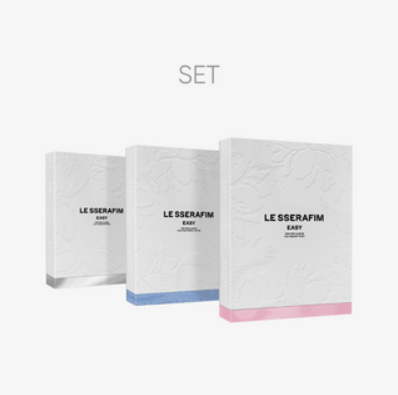
Unauthorized reproduction and distribution prohibited.
